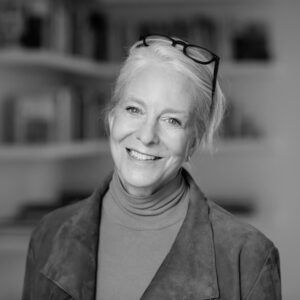To write her best-selling novel, ‘Lessons in Chemistry,’ Bonnie Garmus had to start a few fires
‘If we applied the laws of chemistry to our daily lives, this would be a very different place that we live in.’
The Boston Globe | February 19, 2023
Bonnie Garmus and her best-selling novel, “Lessons in Chemistry,” have had a whirlwind 11 months. Her debut fiction was released in March 2022, and later this year, Apple Studios will bring her story to life. Garmus served as the streaming series’ co-executive producer alongside executive producer and Academy Award winner Brie Larson, who will star as the book’s uncompromising and brilliant heroine, Elizabeth Zott.
The feminist historical fiction has won numerous awards, including the people-pleasing (best debut novel from GoodReads Choice Awards in 2022) and the prestigious (the Hay Festival book of the year 2022), and has been translated into 39 languages. Garmus noted that it has even been added to an all-boys school’s curriculum to teach students about sexism at an earlier age.
The book, which takes place in 1960s California, explores both sexism and chemistry as the topics permeate all aspects of Zott’s life. Garmus will appear twice at Chestnut Hill’s Hummingbird Books on Feb. 27 to discuss her novel and meet with readers. In a conversation with the Globe, Garmus discussed her protagonist’s origin story, her favorite authors, and the accidental fires that resulted during her research stage.
Q. Where did you draw inspiration for Elizabeth?
A. She had been a minor character in the very first novel that I’d written [but hadn’t published]. She had been in there, just three sentences. But she came back to me one day when I was having a really bad day at work. I’d experienced some sexism at a meeting — you know, as a woman, I get accustomed to having to shrug a lot of comments or sexism off. And that day, I just couldn’t. And when I went back to my desk, instead of working, I ended up writing the first chapter of “Lessons in Chemistry.”
Q. Do you know someone like her in real life?
A. No, I wish I did. I was writing my role model. I wanted to write a woman who would say what I want to say — or what a diverse number of people who feel marginalized or passed over, walked on, [want to say]. Elizabeth represents not just women, but people who feel that they are missing out on things because they’re neurodiverse or genderfluid or people of color. It’s a huge club of people who have had to put up with a lot in their lives.
Q. How is she able to say exactly what she thinks, especially in the time period of the book?
A. She’s a rationalist. And if you are a true rationalist, then you don’t accept culture as it comes to you. You question nearly everything, you believe in the scientific method. You don’t immediately bend over for culture. You simply say, “Well, wait a minute, I’m not sure that’s how it actually works.” And so I think she was fun to write, for me, because we live in a very irrational world. Elizabeth being a rationalist stands out and seems almost unusual or odd, because she believes that we should live with facts instead of fantasy. It was a joy… to write a character who says, “I don’t accept that,” in that time period. I knew she’d get in trouble, and she did.
Q. How much scientific research went into the novel?
A. I bought a chemistry textbook off of eBay because I needed to write old science. It’s very hard to Google accurate old science, especially old chemistry, because chemistry is always evolving. I also used “The Children’s Golden Book of Experiments.” They took it off the market, in the early [19]60s, because kids were blowing themselves up. The experiments are pretty dramatic, and I know that better than anyone because I started a few major fires in my flat. And then I had [the novel] checked by two PhD women chemists.
Q. You would actually try some of the experiments yourself?
A. Yeah, I felt like I needed to do that to understand a little more. It gave me a lot of respect for the science of chemistry and how much you can teach yourself. But it also made me realize what scientists mean when they say chemistry is a central science, because it does impact every other science. And it is the laws of chemistry, in my opinion, basically rule the earth. And so when I was writing the book, it became clear that if we applied the laws of chemistry to our daily lives, this would be a very different place that we live in.
Q. What authors and books inspire you and your work?
A. Oh, a lot of people. Margaret Atwood is one of my most favorite writers. I always like John Irving. I love Hanya Yanagihara. I love Donna Tartt. I read a lot of nonfiction. And I really liked a lot of writers in that area. The one that I just finished that I really enjoyed was “An Immense World” by Ed Yong. And it’s all about animal intelligence, so I was really happy to read that.
But a lot of people inspire me. I think what I’m most inspired by is craft because if the craft is there, then the story will bloom, and if the craft is not there, then you can tell a story, but I’m not sure how many people will listen.
